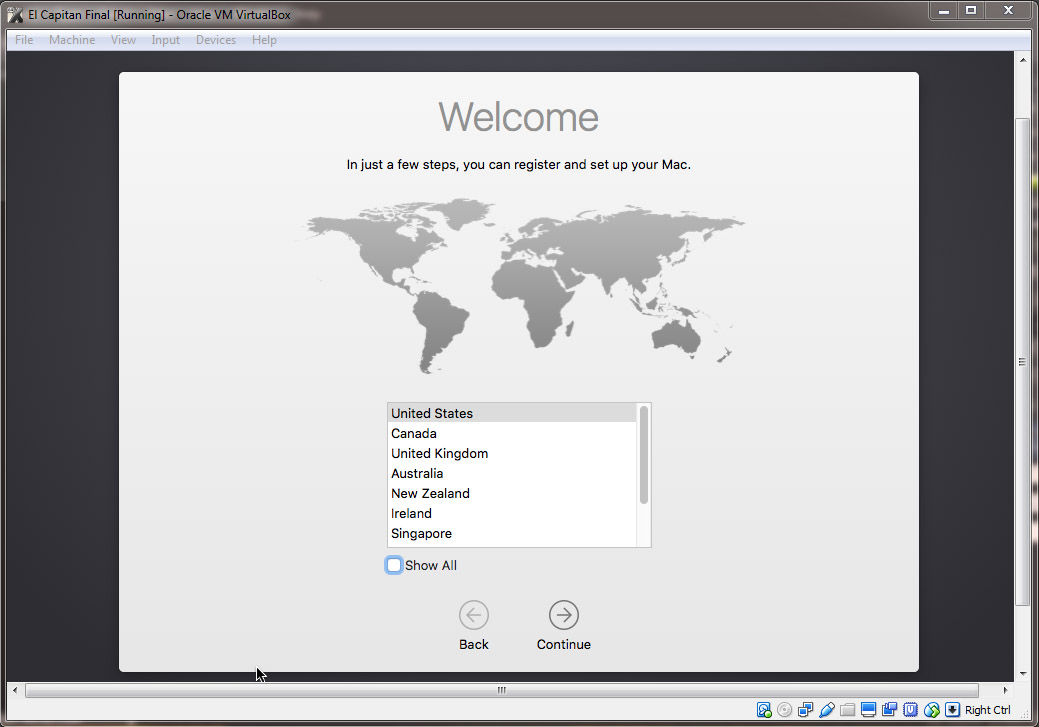I’m trying to install macOS Sierra on VirtualBox, but can’t seem to make it work. For reference, here are the steps I took.
In this document, I will guide you how to install Mac OS 10.11 on VMWare.
- Downloaded the Install macOS Sierra app from the App Store.
- Used the inbuilt media creation executable,
CreateInstallMediaon a disk image. - Created a new VM with the default settings for an OS X El Capitan, plus 128 VRAM.
- Since VirtualBox refused to accept the DMG, I tried splicing out the InstallESD.
- VirtualBox now accepted it, but wouldn’t boot. I tried to boot through rEFInd, but still no luck.
- I tried to patch it both ways (base system and ESD) with iesd. No luck.
- When booting to GParted LiveCD, it flat-out refused to discover any of the installer CDs.
- Install Os X El Capitan.dmg Virtualbox 7 Download OS X El Capitan. For the strongest security and latest features, find out whether you can upgrade to macOS Catalina, the latest version of macOS. If you still need OS X El Capitan, use this link: Download OS X El Capitan. A file named InstallMacOSX.dmg will download to your Mac.
- Running OS X El Capitan 10.11 in VirtualBox. I need to install OS X El Capitan 10.11 as guest OS in VirtualBox running on macOS High Sierra 10.13. I followed the instructions in this guide. I obtained the OS X El Capitan image from here and modified it as outlined in the guide. On startup I get a kernel/cpu panic and was unable to boot.
How can I patch the installer to work with VirtualBox? I don’t want to use pre-patched versions of either the installer or an existing installation, as though to avoid piracy.
Question or issue on macOS:
I have used brew install openssl to download and install openssl v1.0.2f, however, it comes back saying:
And when I do openssl version -a it always gives me:
How To Install El Capitan On Virtualbox
How can I replace the old version with the new one? I’ve searched a lot on how to do this, but the solutions online don’t seem to work for me…
How to solve this problem?

Solution no. 1:
Execute following commands:

You will have the latest version of openssl installed and accessible from cli (command line/terminal). Since the third command will add export path to .bash_profile, the newly installed version of openssl will be accessible across system restarts.
Solution no. 2:
Only
has worked for me!
Thank you mipadi.
Solution no. 3:
Try creating a symlink, make sure you have openssl installed in /usr/local/include first.
More info at Openssl with El Capitan.
Solution no. 4:
I can’t reproduce your issue running El Cap + Homebrew 1.0.x
Upgrade to Homebrew 1.0.x, which was released late in September. Specific changes were made in the way openssl is linked. The project is on a more robust release schedule now that it’s hit 1.0.
You should fix any issues raised by brew doctor before proceeding.

Note:Upgrading homebrew will update all your installed packages to their latest versions.
Solution no. 5:
I reached this page when I searched for information about openssl being keg-only. I believe I have understood the reason why Homebrew is taking this action now. My solution may work for you:
Use the following command to make the new openssl command available (assuming you have adjusted PATH to put /usr/local/bin before /usr/bin):
ln -s /usr/local/opt/openssl/bin/openssl /usr/local/bin/When compiling with openssl, follow Homebrew’s advice and use
-I/usr/local/opt/openssl/include -L/usr/local/opt/openssl/libAlternatively, you can make these settings permanent by putting the following lines in your .bash_profile or .bashrc:
export CPATH=/usr/local/opt/openssl/include
export LIBRARY_PATH=/usr/local/opt/openssl/lib
Solution no. 6:
This is an old question but still answering it in present-day context as many of the above answers may not work now.
Install El Capitan In Virtualbox
The problem is that the Path is still pointing to the old version. Two solutions can be provided for resolution :
- Uninstall old version of openssl package
brew uninstall openssland then reinstall the new version :brew install openssl - point the PATH to the new version of openssl.First install the new version and now(or if) you have installed the latest version, point the path to it:
echo 'export PATH='/usr/local/opt/openssl/bin:$PATH' >> ~/.bash_profile
Solution no. 7:
this command solve my problem on github CI job and virtualbox
Solution no. 8:
You can run brew link openssl to link it into /usr/local, if you don’t mind the potential problem highlighted in the warning message. Otherwise, you can add the openssl bin directory to your path:
Download El Capitan Without App Store
Solution no. 9:
To replace the old version with the new one, you need to change the link for it. Type that command to terminal.
Check the version of openssl again. It should be changed.